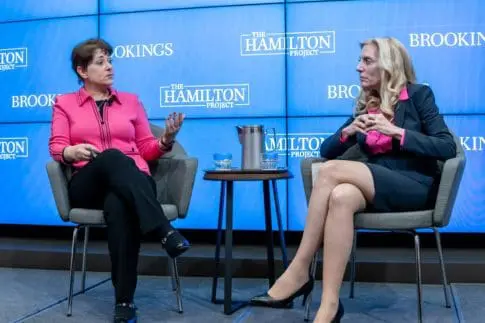Many of the provisions in the 2017 Tax Cuts and Jobs Act (TCJA) are scheduled to expire in 2025, setting the stage for a crucial time for tax policy. On Friday, May 10, The Hamilton Project (THP) at Brookings hosted an event with National Economic Advisor Lael Brainard to discuss the Biden administration’s priorities for future tax policy.
Wendy Edelberg, director of The Hamilton Project, opened the event by highlighting the values that should guide tax reform. Kimberly Clausing and Natasha Sarin’s policy proposal offers four principles to guide tax policy choices, arguing that reforms should (1) raise revenue on net to restore fiscal sustainability, (2) enhance progressivity, (3) minimize distortions and inefficiencies, and (4) tackle global collective action problems. Edelberg added that policy debates too often focus on how proposed tax reform will affect GDP, in contrast with evidence that no major tax reform since 1986 has appreciably affected the size of the economy in the long term.
Brainard then took to the stage for remarks on the President’s plan for tax reform. She emphasized President Biden’s commitment to tax fairness, stating, “Tax fairness is central to the President’s approach to building an economy that works for all Americans.” Brainard reiterated the President’s commitment to ensuring that households earning less than $400,000 do not pay more in taxes, as well as to requiring the wealthy and corporations to “pay their fair share.” She expressed that increasing tax revenues from the wealthy and corporations is essential to the nation’s fiscal trajectory and to protecting programs such as Social Security and Medicare.
“Tax fairness is central to the President’s approach to building an economy that works for all Americans.”
—Lael Brainard
Brainard concluded her remarks by calling for the United States to align itself with a historic multilateral agreement on a global minimum tax for multinational corporations.
Edelberg then joined Brainard on stage for a fireside chat. When asked about the President’s priorities beyond the expiring TCJA provisions, Brainard stated that corporate tax revenues as a share of GDP are “too low” relative to historic levels and relative to other OECD countries. She added that the Biden administration would like individuals earning over $100 million to pay a tax rate more in line with the average American’s.
Brainard also discussed the importance of funding the Internal Revenue Service (IRS): “The IRS has been dramatically underfunded and has been, as a result, unable to do the kind of work that is necessary to fulfill its responsibility under the law.” She highlighted progress as a result of IRS funding included in the Inflation Reduction Act (IRA), including reduced wait times, better customer service, and the successful Direct File pilot.
Edelberg closed with a question on whether Congress, amid growing political polarization and legislative inaction, could take advantage of this opportunity to improve tax policy. Brainard stated, “I think there’s a very commonsense approach to solving these important problems, and there’s simply no excuse for not doing so.”
This is a summary of “Taking on tax: A conversation with National Economic Advisor Lael Brainard.“




